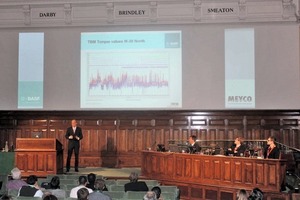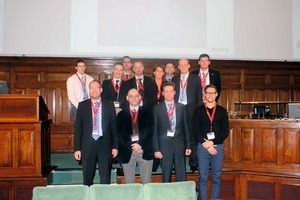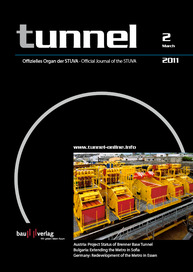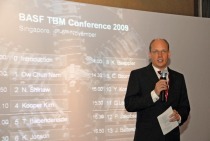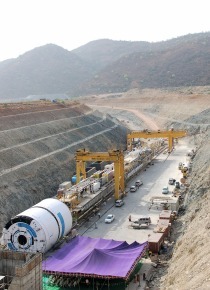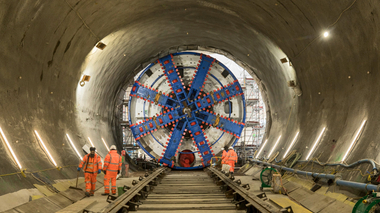2010: Fourth BASF TBM Conference in London
The fourth TBM Conference organised by MEYCO Global Underground Construction and tailored specifically to the needs of tunnel-boring machines returned, following the extremely successful event held in Singapore in 2009, to Europe, and to the roots of tunnel construction, in London. The English capital is, at the same time, opening a path into the future, in the form of the Crossrail project.
More than one hundred and thirty international tunnel-engineering specialists met in the historic buildings of One Great George Street, in the heart of the metropolis, on October 28, 2010, to obtain the latest information on developments in mechanised tunnel construction.
Following an introductory discourse by Chris Fletcher, the head of BASF Admixture Systems North and Bob Ibell, Chairman of the British Tunnelling Society, the conference began with an initial focus on „London: History - Geology and experience from previous tunnel projects“. Other thematic emphases were set by presentations of exceptionally interesting international projects, information on and around the subject of abrasion, and recent developments in research and industry.
Robert Hulse, head of London‘s Brunel Museum, highlighted the world‘s oldest tunnel and its history, providing unique insights into the farsightedness and daring of the engineers of the time, and into their solution methods, many of which are still used today.
Bob Allen, of London Bridge Associates Ltd., illuminated in great detail the special circumstances and features of London‘s geology. Highly illustrative examples drawn from completed projects augmented his paper, making it uniquely instructive.
Ulrich Rehm, of Tunnelling Consultant GmbH, examined in detail the complexity of mechanised tunnelling, the efficiency of which depends decisively on the TBM itself, on the geology encountered, and on the tunnelling crew. Also of great importance are the changes in the consistency and behaviour of the ground caused by the various conditioning agents and by water.
Jesse Heinemann, of Robbins, presented a detailed look at the Metro Line 12 project in Mexico City, including a comprehensive analysis of the geology encountered, and of the modifications to the cutting wheel, extraction screw-conveyor, back-filling and ground-conditioning systems of the EPB machine used, and rounding off his address with a discussion of the current status of tunnelling on this project.
Richard Foord, of BASF, spoke on TBM tunnelling operations in Britain, conducted predominantly, then and now, in clayey soils. A theoretical introduction to the world of anti-clay additives was followed by a discussion of their efficiency, citing a range of projects involving differing requirements.
Karin Bäppler, of Herrenknecht AG, provided an overview of innovations in the field of mechanised tunnelling, and outlined a road into the future via complex geologies and ever greater machine diameters.
Craig Bournes, of Lovat Caterpillar, concentrated essentially on the geology of glacial sediments and their implications for the construction of tunnel-boring machines, with particular attention devoted to cutting-wheel design, the requirements made on the cutting tools and the extraction concept, and the ground-conditioning system.
Tim Babendererde, of Babendererde Engineers, focussed on the various types of abrasion, their effects on rate of advance and overall construction costs, and on the potentials for early detection by means of suitable data-acquisition and data-evaluation systems. Examples from around the globe were used to illustrate incisively the associated difficulties and their implications.
Christian Frenzel, of the Colorado School of Mines, also dealt in detail with the problems of abrasion and its significance for the design of cutting tools. Particular attention was devoted here to disks and reamers, including discussion of their metallurgical potentials and their interactions with one another.
Erik Østby-Delgum, of the NTNU University of Trondheim, extended the topic of abrasion into the field of non-cohesive rock, examining a number of forecasting models and providing a highly informative perspective on upcoming research activities.
Markus Thewes, of the Ruhr University of Bochum, tackled the subject of ground conditioning in gravel-bearing soils. A theoretical examination of the problems was followed by the initial test results obtained using a new ground-conditioning system. These permitted the derivation of interesting conclusions concerning various means and methods for this work. Further expansion of this test system is now planned.
Lars Langmaack, of BASF, concluded the conference with an address on the latest developments in the field of TBM additives. The focus here was on anti-abrasion additives (a subject also featured at the last ITA conference, in Vancouver), the background to the anti-clay polymers, and the development of a new generation of environmentally safe ground-conditioning agents based on regenerable input materials.

